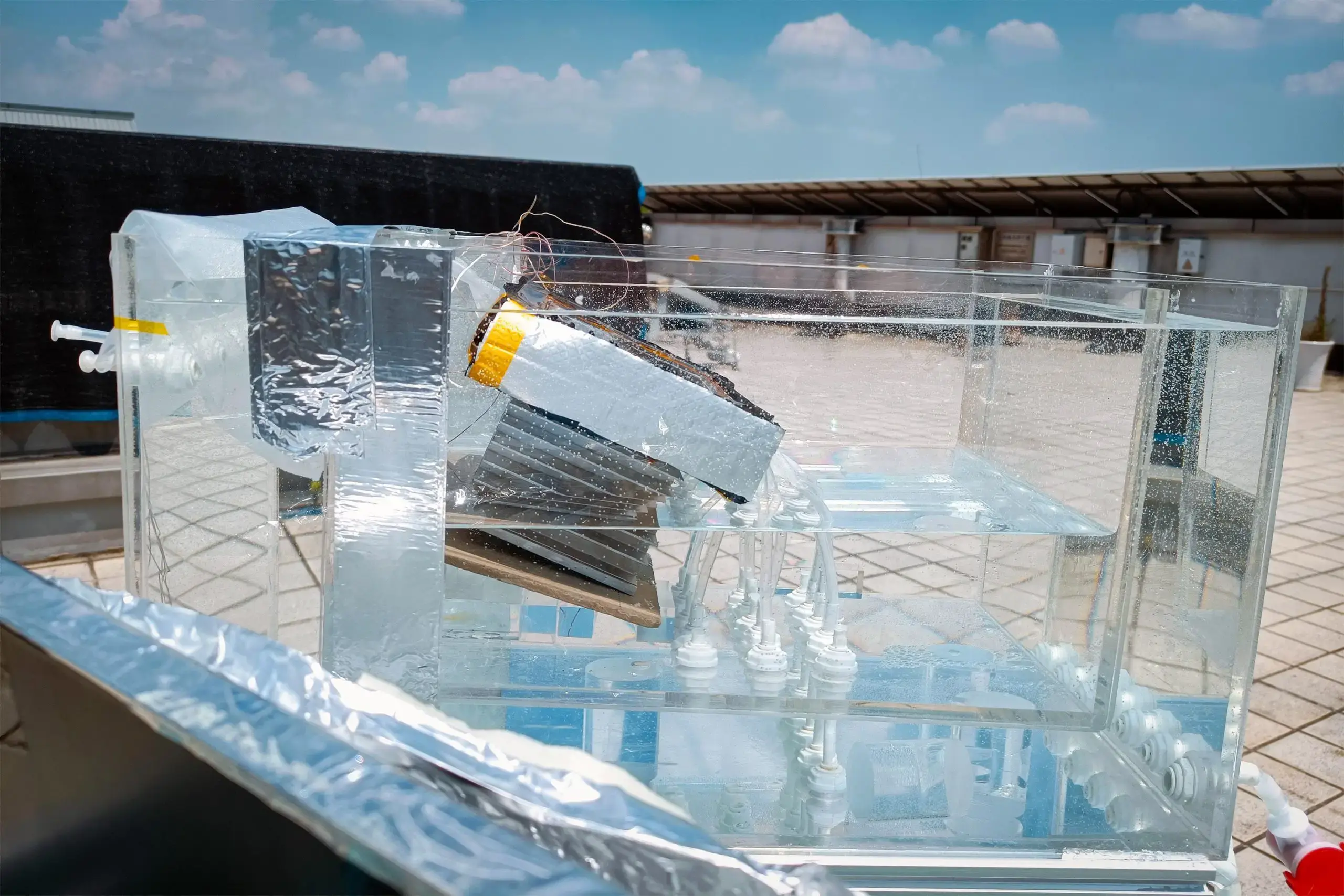Automatically rejecting the salt is huge!
you meant to say “tight!”
Sure! Something positive to point out how great that feature is.
Learning new vocabulary is tight!
“The researchers estimate that if the system is scaled up to the size of a small suitcase, it could produce about 4 to 6 liters of drinking water per hour and last several years before requiring replacement parts.”
Is this really that early in the research or is there some other barrier to testing that in the near future, as in if it were that practical why didn’t they do it already?
Here’s a hint: What to do with all the fuckin waste products??
People are paying good money for sea salt all the time in grocery stores.
That’s the same issue as now.
Maybe funding. Get a grant of $10,000 and you can only build something so big.
Use that to prove it’s a viable idea that could work and go searching for a $100,000 grant to make a bigger real-use one and make refinements to then use to search for investors that can start manufacturing.
Well what are you waiting for? Give em 100k. Geeze.
the design for a new solar desalination system that takes in saltwater and heats it with natural sunlight.
The configuration of the device allows water to circulate in swirling eddies, in a manner similar to the much larger “thermohaline” circulation of the ocean. This circulation, combined with the sun’s heat, drives water to evaporate, leaving salt behind. The resulting water vapor can then be condensed and collected as pure, drinkable water. In the meantime, the leftover salt continues to circulate through and out of the device, rather than accumulating and clogging the system.
Neat.
The team envisions a scaled-up device could passively produce enough drinking water to meet the daily requirements of a small family.
Hmm.
The last paragraph is cool too though. A single device for a household that produces enough water would be big for many communities. The only real question here is how complex and expensive the device is.
I wonder whether that’s safe enough considered there much shit in salty water than just salt but judging by the fact it’s condensing I guess that’d mean yes?
Most of the shit will remain down with the salt, as they’re too dense to flow upwards with the water vapor.
Btw, that’s pretty much distilled water, right? While drinkable, it’ll be lacking some needed minerals, no?
It’s literally distilled water. I don’t know what this technology does that other evaporative distillation systems don’t already do, besides being solar powered.
No. You can get those minerals from your food. It is safe to drink distilled water. But there is a lot of misinformation about distilled water, I have even had people tell me it can kill them! Water is water. Get your minerals from food.
Tbf, chugging over a gallon of distilled water in one go will actually kill you though
Better than chugging a gallon of artificial sweetener, caffiene and flavours.
Isn’t a gallon almost four litres? A gallon of anything is going to be dangerous to drink all at once.
Isn’t a gallon almost four litres? A gallon of anything is going to be dangerous to drink all at once.
That’s the joke
Good to know, I had the misconception that you could only get some never specified minerals from freshwater and that distilled water would leave you mostly thirsty.
Likely from some company trying to sell expensive foul tasting “sports water”. Eat a bag of crisps with your water if you are really concerned about your salt intake.
Drinking distilled water will not leave you thirsty. And on a study here in Australia on teenagers drinking electrolyte sport drink vs water while doing athletics, it was proven there was better athletic performance from the water drinkers… Which brings a lot of the advertising into question.
Sorry, what study exactly?
Electrolyte (e.g. Potassium) replacement during intense exercise is essential. That’s why every athlete nowadays uses it.
Brawndo’s got what humans crave. It’s got electrolytes!
Other stuff should be limited since the water evaporates and is then condensed. Little should be carried with it, but I don’t know for certain.
https://doi.org/10.1016/j.joule.2023.08.012 link to the journal article
The trick is thermohaline circulation, basically salty water moves differently then fresh water in cold and warm environments. So to promote that effect the stage is tilted to allow warmer fresh water above cooler salty water below. Then a membrane moves the salt out of the circulation so as not to accumulate and clog the system.
The thing is that scaling this upward would present some challenges structurally to do large volumes OR the complexity would increase if they kept the same size and just made thousands of these little stages. Not to mention that, depending on what they’re using for a membrane for salt removal, having a larger surface area could make it easier or more difficult to maintain. Easier in that you only need to clean it every so often (the membrane helps spread the load) or more difficult in that such a large membrane requires delicate processes to change out.
Also commercial production requires a fixed output, so with sunlight being variable any commercial installation would require storage.
But reading the brine discharge always makes me wish that grid based sodium ion batteries would be researched more. But can’t have that because oil companies already put large deposits into lithium mines.
But reading the brine discharge always makes me wish that grid based sodium ion batteries would be researched more. But can’t have that because oil companies already put large deposits into lithium mines.
Its light on specifics but China is already producing Sodium batteries which makes sense for a nation that is technologically advanced, but resource poor. Since China doesn’t have any entrenched petroleum interests, and is geopolitically distant to most of the proven cobalt and lithium supplies, it makes sense for them to use what they have plenty of.
Honestly, I’m excited about this. Sodium batteries aren’t very energy dense, but they should be very cheap. Lots of applications don’t need physically small batteries (like grid or solar tied).
The main problem I always hear with this is “where does the brine go?”
It can’t easily be dumped without causing ecological chaos. In the water it can kill ocean life. On land it can make plant life never grow again in certain areas, also leeching into groundwater.
I love this technology buy am apprehensive about its deployment.
Put it in empty oil tankers and have them disperse it through the ocean. Might have to retrofit them to put a port that leads to the ocean but besides that should be pretty cheap. No reason that empty tanker heading back to Saudi Arabia can’t be filled with brine.
Not an expert here but the word that comes screaming into my head seeing that is ‘rust’. Would the brine be easier to deal with solidified into salt? Even edible?.
That would likely make it much more expensive than tap water, rendering the device almost pointless except in cases where they probably couldn’t afford it anyways.
Sell it as edible salt.
This is the actual answer - you put this in evap fields with no run-off potential (so as not to harm fresh or salt water environments), dry your slurry through stages and then sell the salts commercially for further refinement and consumption.
Total US salt production is roughly 40 million metric tons (or 40 billion kg) per year.
Let’s say we use this process to desalinate water for just 10% LA County’s water needs. LA County currently uses 1.5mm acre-feet of water per year. In SI units, this is about 2 trillion liters each year.
There’s about 35g of salt in each liter of seawater.
So… at just 10%, we’re desalinating about 200 billion liters a year and producing 7 million tons of salt.
If we desalinate for the rest of the state, or the rest of the Southwest, we’ll easily be producing more salt each year than all of the mining activity nationwide.
At some point the excess salt will have no buyers, and we will still need to deal with it.
I’m a fan of the simpler approach: Build long-ass pipes out into the ocean, and slowly dilute the brine so that it’s not concentrated in any one spot. The total salinity of the entire ocean will not change by any perceptible amount, so long as you don’t drop heavy brine in any one spot.
Sorry, forgot to add sources:
Those are going to be some long as spipes indeed if you want to pump brine out without salt spots.
quite true, although we already have long ass pipes/cables in the ocean for phone/internet connections between continents. So it’s entirely doable, and is already being done for another purpose besides salt.
Yeah. It may be “simple” but it’s not going to be cheap. I still think it’ll be cheaper than dedicating huge swaths of coastal land to become brine-drying fields, though.
It could be used in molten-salt batteries, however I’m not sure of how efficient the technology is.
I’m pretty sure we can find more uses for ocean salt. At the amounts we’re talking about people will find uses for it. One of the things people tend to ignore is that ocean water contains a lot more than just salt. It also contains metals and organic compounds. Looking over the Wikipedia article there is a significant component of magnesium, sulpher, calcium, potassium, and bromine. There are even industries devoted to extracting sodium, magnesium, potassium, and calcium from sea water. If we substantially increase the desalination of sea water we could significantly reduce the cost of extracting them. With the amount of brine you’re talking about it would pretty much be free to anyone who could find a use for it, since the alternative is diluting it and pumping it back into the ocean, which is pure cost. At that scale you could likely also extract trace components in significant quantities. The page mentions lithium and uranium were attempted in the past, with uranium never seeing industrial scale due to it being too expensive, but economies of scale and all that.
Under capitalism they’d not buy the excess because they want to keep the price up but this is a good path towards post scarcity with salt
Like how some places get salt. Put it in a pool and let it evaporate in the sun
Idk. Sodium batteries? Dump it in the desert?
What do they do with the waste tho
aren’t we looking for salt in winter to spread on roads? There’re mining here for this purpose, I don’t think salt would be a waste, if we’re talking about salt and I’m not missing something else. Because I don’t read those articles don’t want to get hope with a new revolutionary device until I see them in use.
I guess those news exist because scientists have hard time getting funds, so they have to sell miracle in hope to continue their researchs
Get this shit to North Africa on the double!
Annnnd we’ll never see it ever again
Honestly this is why I never pay any attention to “uplifting news” communities as it ultimately gets your hopes up for nothing. The bi monthly “revolutionary cure” for cancer is getting pretty damn old too.
Shitty news does the opposite though, we hear all this miserable shit be it from war to policy doomsayers but other than the people in the war life just goes on as relatively normal.
The only thing I can say that isn’t the case for was Covid.
This isn’t to say that things aren’t shitty for a lot of people or the likes of pay and conditions are getting worse, just the news makes everything sound like it is going to be worse. I’m thinking of all these laws and policies that were set to doom us all, like net neutrality…nothing about my life changed from that.
China
If they can get it, they will build it. There’s already water scarcity on some regions there. No way it will go back into oblivion.
deleted by creator



















